Search free Iowa divorce records efficiently and seamlessly.
This article will provide effective options to assist you in this endeavor. You can use the tools and resources below to learn more about someone’s marital history or to assist in your family genealogy search. Also, you can learn how to request a certified copy of a divorce record, which may be needed for various business or legal reasons.
Like other public records in Iowa, the availability of divorce information results from the Iowa Open Records Law. This state statute authorizes individuals to search and acquire divorce records for any reason.
However, such records may be accessed differently depending on where and when they were issued and other factors. This resource will walk you through searching new and historic divorce records and how to request a copy of any dissolution document with the proper record custodian.
Who Can View Divorce Records in Iowa?
In Iowa, anyone can perform a free public divorce records search thanks to their public records laws.
Chapter 22 of Iowa state law authorizes the examination of public records, including divorce documents.1 However, these documents are only considered public once the divorce is finalized, so this does not apply to open cases.
Iowa law does not make a distinction between certified and non-certified divorce records. As a result, there are no specific exceptions to who can make a request for any type of Iowa divorce record. While divorce records are public information, it does not mean they are accessible anywhere.
For full access to a divorce record, you may have to submit a request to the Clerk of Court in the county where the divorce was finalized.
Iowa also has general data available from the census that can be helpful to give you a general understanding of the trends and rates of divorce in the state.
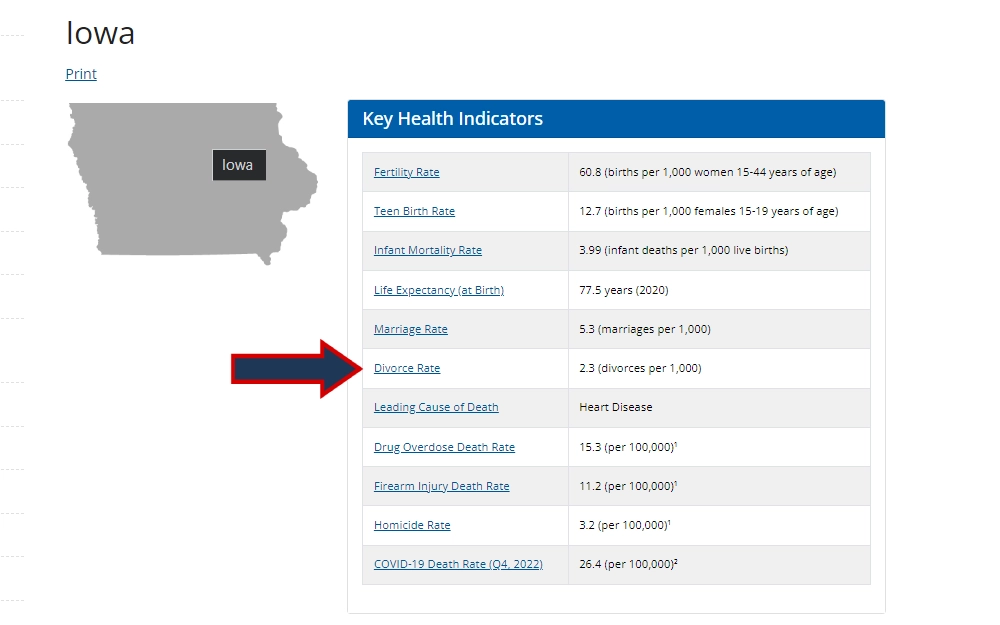
While the Iowa government does not post data on its own, the most recent information provided by the CDC’s National Center for Health Statistics indicates that there are 2.3 divorces per 1,000 people in the state.2
How To Access Iowa Divorce Records for Free
To access public divorce records in Iowa, a citizen can start by using the court’s Electronic Docket Record Search.3
The unified docket search tool provided by the Iowa courts is a limited search tool in that it provides an index of information instead of actual detailed records.
To use this search tool, you can perform either a name or case ID search. If using the name search, you can enter a subject’s name or alias. You can even search using the names of other parties involved in the case, such as a judge or attorney.
Note: There is a case-type drop-down menu to narrow down your results, but there are no specific options for domestic cases. The furthest you can narrow down your search options is by selecting “Civil” for the case type.
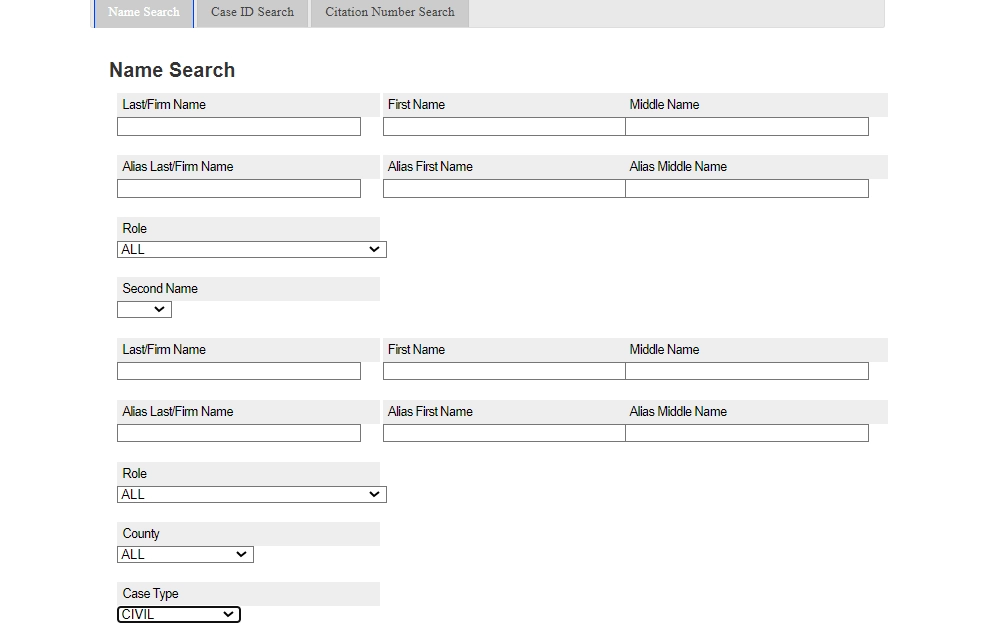
When you complete your search, you will be able to view a brief summary of the case, including the party’s names, case number and the status and date of the disposition. In addition, you can view the county that handled the divorce case.
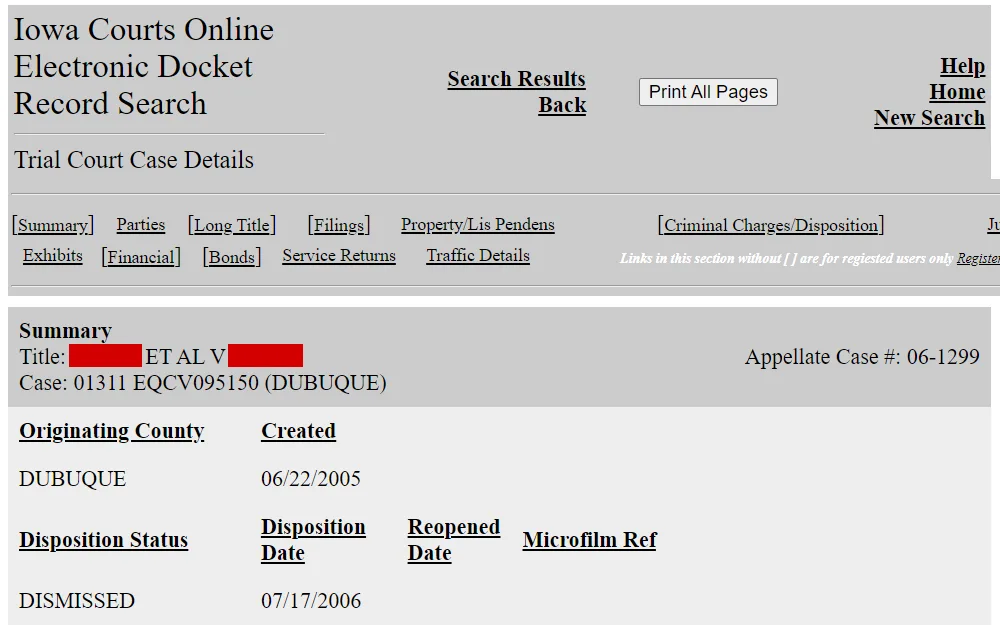
While this information may not satisfy your ultimate needs, it can provide you with valuable information as you continue your search for statewide divorce records. This information can be used to continue your search with the county in which the case was filed.
You can also use this information to perform a search online if the county court has that option available, to search the divorce records in person or make a request by mail or phone.
In addition to searching divorce records, if you want the actual certificate, you will have to make a records request with the clerk for the county court where the divorce was issued. Typically, a record request can be made in person, by phone or by mail.
You should call the specific county clerk for additional information, as there are nuances and differences in the various counties in Iowa. Below, details on accessing this type of information in a few counties will be provided to give you an idea of how the process works.
Finding Divorce Records in Iowa Counties
You now know how to view divorce records at the state level, which provides you with the ability to perform a broad search. However, that may not be needed or desired. You can also search for divorce records at the county level, and if you know where an individual was issued their divorce decree, this may be a more appealing option.
You may prefer to search at the county level because it’s easier to access the records, or you have questions that you would like to talk to someone in person about. Whatever your reason, it is important to know that the process for searching for divorce certificates at the county level may have its own nuances and differences.
Below is a brief summary of how you can search for divorce records in Iowa’s three most populous counties.
The most populous area in Iowa is Polk County. To access divorce records in Polk County, you can make a request through the Clerk of Court. To request divorce records with the Polk County Clerk of Court, you can go to their office located at the address below or submit a written request:5
Polk County Clerk of Court
500 Mulberry St.
Des Moines, Iowa 50309
Before you go to make a request, you should contact them by phone at 515-286-3772 to ask them what their process is for requesting divorce records.
Note: While many states have county health departments and vital records that are also custodians of divorce records, in Iowa, these records are solely maintained by the Clerk of Courts.
The next largest county in Iowa is Linn County. If you want to access divorce records in this county, you can do so by making a request with the Linn County Clerk of Court.6 The civil division (where family cases are handled) can be contacted by phone at 319-398-3411 (ext. 1212).
The Clerk of Court’s Office in Linn County is open Monday through Friday from 8:00 AM to 4:30 PM. If you want to submit a written request or go in person, the Linn County Clerk of Court is located at the below address:
Linn County Courthouse
51 Third Ave. Bridge
Cedar Rapids, IA 52401
The third largest county by population in Iowa is Scott County. In Scott County, a citizen can access divorce records through the Clerk of the District Court for Scott County.7 To get specific information on the processes for requesting a divorce record, you can call them at 563-326-8647.
They are open from 8:00 AM to 4:30 PM, Monday through Friday. The Clerk of Court is located at the below address:
Clerk of District Court
Scott County Courthouse
400 West 4th Street
Davenport, Iowa 52801
For all counties: Use the Electronic Docket Record Search to get basic information about what county a divorce was handled. From there, search to get the phone number or address of the Clerk of Court in that county and contact them for more information on their record request process.
Obtaining Archived Divorce Information for Free via Iowa State Archives
For genealogy searches and other reasons, you may have a need to access archived divorce records. A citizen who wants to search archived divorce records throughout Iowa can do so by searching available state records and divorce indexes.8
These archived records are provided by the State Historical Society of Iowa.
The State Historical Society of Iowa provides these records, but you will have to go in person to their research center to view these records on microfilm. Here, you can find archived divorce records from 1906 to 1940. To view their records, you can go to one of the two below locations:
State Historical Building
600 East Locust Street
Des Moines, Iowa 50319
Phone: 515-281-6200
Centennial Building
402 Iowa Avenue
Iowa City, Iowa 52240
Phone: 319-335-3926
These research centers are open Tuesday through Friday from 9:00 AM to 4:30 PM. While not required, it is recommended that you schedule an appointment if possible. You can also call either location at the numbers provided above if you have specific questions about searching for archived divorce records at their research centers.
Another option is to submit a reference and reproduction request online. However, this is only a viable option if you have specific identifying information on the record you are requesting.
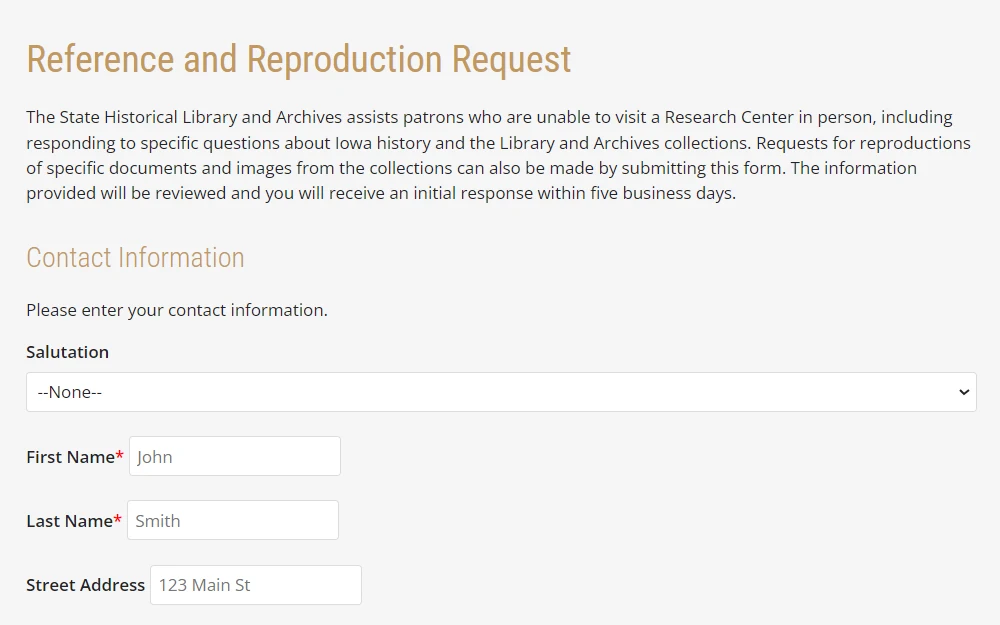
In addition to the State Historical Society of Iowa, archived divorce records can be found in other places. Especially when it comes to older records, you may be surprised to find these documents in public libraries, churches and old newspapers.
Does Iowa Legally Allow for Common Law Marriages & Divorces?
A common law marriage is when parties are considered married despite never having exchanged wedding nuptials or obtained a marriage license. In Iowa, common law marriages are recognized when the following elements are present:10
- Both parties have an intent to be married
- Both parties either declare they or married or indicate they are husband and wife in public
- Living together for a continuous period of time as spouses
- Both parties have the capability to enter a marriage
Iowa does not require a specific timeframe that has to be met for any of the above requirements to be in a common-law marriage. However, you will still need to have the court officially declare that you are in a common-law marriage. Usually, this occurs in the context of a divorce request.
A party will file a petition for a divorce, and, at that time, the court will have to make a determination as to whether a common law marriage was ever established.
Common law marriage is no different than legal matrimony; that means that a common law marriage comes with the same rights as if you were formally married.
That also means that to obtain a divorce from a common law marriage, you will be required to go through the same process as if you wanted to end a traditional marriage (how to start the divorce process and respond to a petition for dissolution are discussed later in this article).
In Iowa, civil unions and domestic partnerships are not established by law. However, same-sex marriages are legal in Iowa.
How To Look Up Iowa Dissolution of Marriage & Common Law Divorce Records
If an individual wants to look up information on a dissolution of marriage, they can do so by starting their search with the Electronic Docket Record Search and then continuing their search with the court where the case was filed. In Iowa, a dissolution is synonymous with a divorce, so the two are the same thing.
Common law divorces are handled by the same courts and processes as the dissolution of traditional marriages. To look up these types of divorces, you can use the Electronic Docket Record Search or perform a search with the county courthouse that issued the final decree of divorce.
For both types of divorce records, the record custodian is the Clerk of Court in the county where the dissolution occurred. When you find out what county the divorce occurred in, contact the Clerk of Court, as each county may have its own process for accessing and providing divorce records. Some counties may provide online requests, while others may only provide records in person.
How To File for a Divorce & Respond to Divorce Petitions (Iowa Divorce Process)
Whether you have been served with divorce papers or are planning on filing your petition, this process can be mentally and emotionally draining. On the bright side, it’s helpful to understand the basic process for filing and responding to a petition in Iowa to relieve some anxiety.
The information below will provide you with an introductory understanding of starting the divorce process in Iowa.
The only grounds for divorce in Iowa is that there is a breakdown of a marriage with no likelihood that it can be restored. That is because Iowa is a no-fault divorce state, which means there does not need to be a specific finding of fault. In states that require fault, the party filing for divorce must prove the other party committed some act in violation of their marriage, such as desertion or adultery.
However, there are some basic requirements before a person can consider filing a petition for divorce. Either the person being served the divorce petition must be a resident or the person filing for divorce must have lived in the state for at least one year.
If an individual meets these requirements, they can prepare a Petition for Dissolution of Marriage and file it in the county where they currently reside.11 There are two different forms, depending on whether you have children or not. Iowa also provides interactive forms that you can use to submit a petition online.12
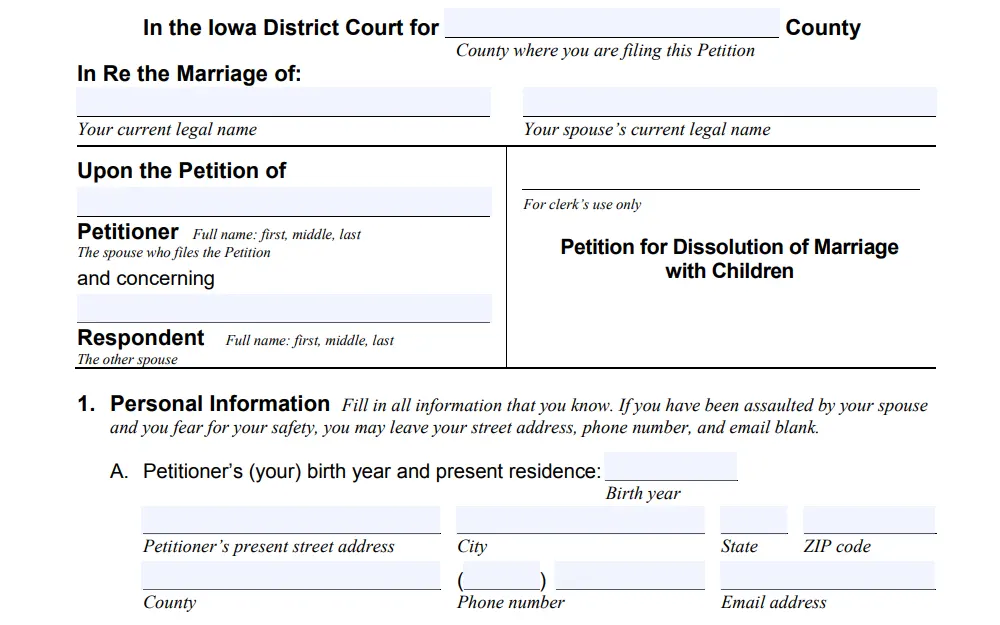
The Petition for Dissolution of Marriage gives the court the information needed to begin the divorce process. This includes information on you, your spouse and the marriage. The Petition also tells the court what you are asking the court to do as it pertains to a variety of interconnected matters.
Some examples include:
- Name change
- Custody of children
- Spousal support
- Alimony
- Child support
- Protection order
- Division of assets
In addition to providing this document to the county court, you must also provide the petition to your spouse. To prove that you delivered the petition to your spouse, you must provide an Acceptance of Service that your spouse can use to notify the court in writing that they were served.
If you do not know where your spouse is, you can have a Sheriff serve the Petition. As a last resort, you can ask the court to allow you to publish a notice in a newspaper.
If you are on the receiving end of a divorce petition, you will be required to submit an “Answer” within twenty days of when you received it.
The Answer allows you to tell your side of the story and either agree or disagree with anything presented in the Petition. You can also provide any specific requests you want that were not mentioned in the original petition.
Other things to consider when you are going through this process is whether there was a prenuptial agreement or not. If not, depending on your situation, you may need to consider things such as a divorce appraisal, mediation and figuring out a settlement agreement with your spouse.
Regardless of what side of a divorce you are on, it is incredibly helpful to speak to an attorney who specializes in this area of law. They can help answer any specific questions you may have and deal with any unique or difficult situations that may arise.
You now have a better understanding of the divorce process and how to access a variety of these types of records. This includes both recent and archived divorce records that can be used for a variety of reasons. Use the tools and resources outlined in this article whenever you need to search Iowa divorce records.
References
1Iowa Legislature. (2022, December 29). Chapter 22 | Examination of Public Records. Retrieved November 15, 2023, from <https://www.legis.iowa.gov/docs/ico/chapter/22.pdf>
2Centers for Disease Control and Prevention. (n.d.). Iowa Key Health Indicators. National Center for Health Statistics. Retrieved November 15, 2023, from <https://www.cdc.gov/nchs/pressroom/states/iowa/ia.htm>
3Iowa Courts. (n.d.). Online Electronic Docket Record Search. Retrieved November 15, 2023, from <https://www.iowacourts.state.ia.us/ESAWebApp/DefaultFrame>
4Iowa Courts. (n.d.). Online Electronic Docket Record Search. Retrieved November 15, 2023, from <https://www.iowacourts.state.ia.us/ESAWebApp/TrialSimpFrame>
5Iowa Judicial Branch. (n.d.). Polk County Clerk of Court. Retrieved November 15, 2023, from <https://www.iowacourts.gov/iowa-courts/district-court/judicial-district-5/district/5/county/polk>
6Linn County, Iowa Government. (n.d.). Clerk of Court. Retrieved November 15, 2023, from <https://www.linncountyiowa.gov/1123/Clerk-of-Court>
7Scott County, Iowa. (n.d.). Clerk of Court. Retrieved November 15, 2023, from <https://www.scottcountyiowa.gov/courts/clerk-court>
8State Historical Society of Iowa. (n.d.). Vital Records. Retrieved November 15, 2023, from <https://history.iowa.gov/history/research/collections/vital-records>
9State Historical Society of Iowa. (n.d.). Research Center Appointment Request. Retrieved November 15, 2023, from <https://history.iowa.gov/history/form/referencerequest>
10Iowa Legislature. (n.d.). Common law marriage. Retrieved November 15, 2023, from <https://www.legis.iowa.gov/docs/iac/rule/04-12-2006.701.73.25.pdf>
11Iowa Judicial Branch. (n.d.). Court Forms. Retrieved November 15, 2023, from <https://www.iowacourts.gov/for-the-public/court-forms/>
12Iowa Judicial Branch. (n.d.). Divorce. Retrieved November 15, 2023, from <https://www.iowacourts.gov/for-the-public/representing-yourself/divorce/>
